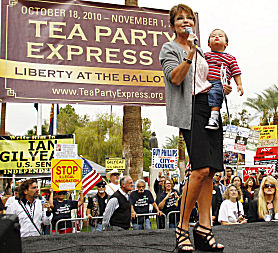 In a time when extremists at both ends of the political spectrum are hard to reason with, it’s a relief to hear a sane voice in the wilderness. David Frum is one of my favorite conservative commentators (along with David Brooks). He offers some sage advice to Republicans in a post-Tea-Party world.
In a time when extremists at both ends of the political spectrum are hard to reason with, it’s a relief to hear a sane voice in the wilderness. David Frum is one of my favorite conservative commentators (along with David Brooks). He offers some sage advice to Republicans in a post-Tea-Party world.
On understanding that the economy is more important than the budget: “If fiscal stimulus leads to socialism, and quantitative easing [fighting inflation] leads to Nazism, what on earth are we supposed to do?”
On the welfare state: (emphasis added)
Even from a conservative point of view, the welfare state is not all bad. … [P]ost-Depression … social-welfare programs … were not motivated only — or even primarily — by “compassion.” They were motivated as well by the desire for stability. … “[A]utomatic stabilizers” [of the economy]. …
This shift to a more welfare-oriented economy helps explain why business cycles in the second half of the 20th century were so much less volatile than they were in the 19th century. And fortunately enough, this shift put a floor under the economic collapse of 2008-09. …
Those who denounce unemployment insurance as an invitation to idleness in an economy where there are at least five job seekers for every available job are not just hardening their hearts against distress. They are rejecting the teachings of Milton Friedman, who emphasized the value of automatic stabilizers fully as much as John Maynard Keynes ever did. Conservatives should want a smaller welfare state than liberals in order to uphold maximum feasible individual liberty and responsibility. But the conservative ideal is not the abolition of the modern welfare state, and we should be careful of speaking in ways that communicate a more radical social ideal than that which we actually uphold and intend.
On the Tea Party and class conflict:
Non-Tea Party Americans may marvel that any group can think of itself as egalitarian when its main political goals are to cut off government assistance to the poorest and reduce taxes for the richest. But American populism has almost always concentrated its anger against the educated rather than the wealthy. So much so that you might describe contemporary American politics as a class struggle between those with more education than money against those with more money than education: Jon Stewart’s America versus Bill O’Reilly’s, Barack Obama versus Sarah Palin. …
Conservatives will not find it much easier than liberals to govern a society where so many people feel themselves cheated — and where so many refuse to believe that the so-called experts care for the interests of anyone beyond their narrow coterie and class.
In conclusion:
The message we hear from some Republicans — “this is no time for compromise” — threatens to extend the failures of governance for at least two more years. These failures serve nobody’s interest, and the national interest least of all.
From the mouths of fools
Comedian Jon Stewart, appearing in an interview on The Rachel Maddow Show, had more insight than most of the current media commentators on cable “news.” It’s not about the Left vs. the Right, he said. It’s about those who favor corruption vs. those who oppose it.
Related posts:
Democrats and Republicans: How they differ
The dismal future of unemployment
Understanding the Tea Party
A generation obsessed with material wealth
Obama on race and the Tea Party
Resources:
Image source: Channel 4 News
David Frum, Post-Tea-Party Nation, The New York Times, November 12, 2010


Sorry, comments are closed for this post.